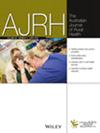Changes in Mental and Physical Health Outcomes Following One Day a Week Cardiopulmonary Rehabilitation in Regional New South Wales
Abstract
Introduction
Cardiopulmonary rehabilitation participation rates in regional Australia remain poor, with outcomes further worsened by the limited number of cardiopulmonary rehabilitation professionals in these settings.
Objective
This study investigated the role of cardiopulmonary rehabilitation in improving physical and mental health outcomes of participants with heart or lung diseases in a regional NSW centre.
Design
A retrospective study of adults who attended a 1-h session per week cardiac or pulmonary rehabilitation programme at Bathurst Hospital between January 2021 and December 2023.
Main Outcome Measures
Pre- and post-rehabilitation assessments were conducted, which included heart rate, blood pressure, oxygen saturation, waist circumference, rating of perceived exertion, 5-sit-to-stand test (5-STS), 6-min walk test (6MWT), and the patient health questionnaire-9 for assessment of depression (PHQ-9 score ≥ 10 = major depression).
Findings
Data for eligible participants (n = 186, mostly males 57.5%), aged 69 ± 12 years, were analysed. There were statistically significant improvements (pre vs. post) in mean PHQ-9 scores (6.3 vs. 4.2, p < 0.001), 5-STS (15.8 vs. 12.5 s, p < 0.001), 6MWT (328.6 vs. 377.9 m, p < 0.001) and waist circumference (104.7 vs. 103.9 cm, p < 0.03) post-rehabilitation. Compared with pre-rehabilitation measures, the overall proportion with major depression was significantly lower by 50% (25.3% vs. 12.4%, p < 0.05) post-rehabilitation. This decrease was significant for the cardiac (11.6% decrease) and pulmonary (15.4% decrease) rehabilitation participants.
Conclusion
Despite the limiting structure of one session per week for the cardiopulmonary rehabilitation programme at this regional centre, participants showed significant improvements in their mental and physical health at the end of the programme. Funding such organic programmes will yield a greater positive impact on the health of people in this region.


 求助内容:
求助内容: 应助结果提醒方式:
应助结果提醒方式:


